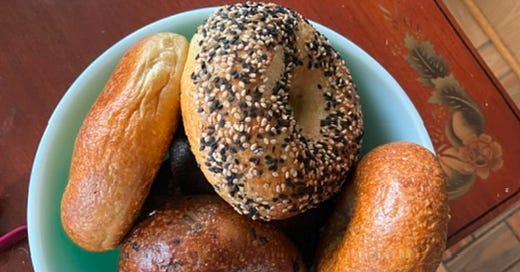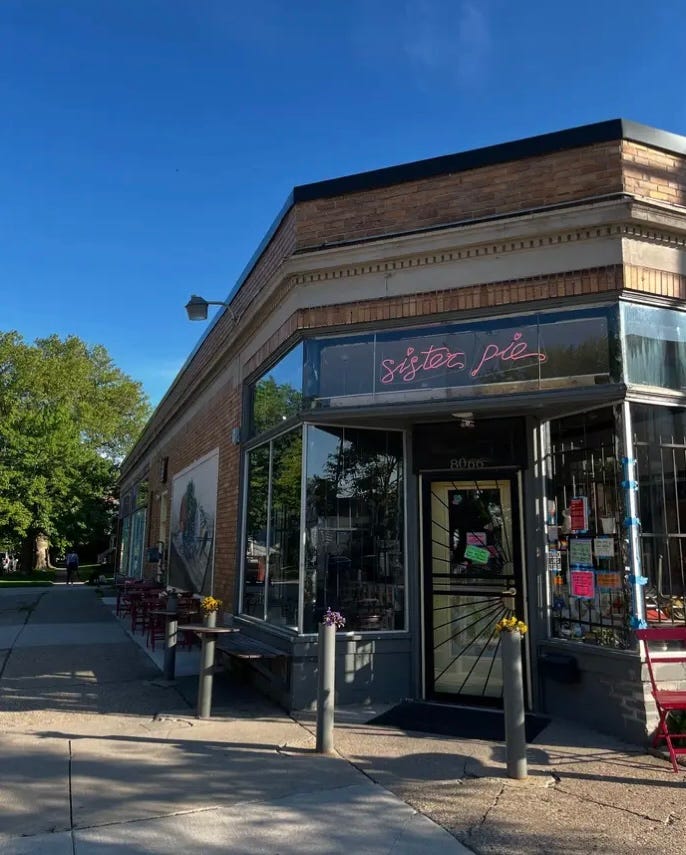Too Good To Go: Fighting Food Waste, One Surprise Bag At A Time
Bargains plus a chance to try out new places
Happy June, CulinaryWoman readers! Happy Dragon Boat Festival to Asian friends!
This month marks our fifth anniversary and I’m delighted that you’ve joined us. CulinaryWoman, based in Ann Arbor, Mich., looks at topics of interest in the food world, often from a financial point of view.
We don’t accept ads or sponsors. We’re entirely funded by you. Please consider becoming a paid subscriber, or you can Buy Me A Coffee in any amount if there’s an article you’ve especially liked.
I’m always interested in innovative ways to approach the food world. The past couple of months, I’ve been participating in one that’s aimed at a big problem.
Tackling The Twin Challenges Of Food Waste And High Prices
Wasted food is a huge challenge, for growers, producers, and consumers. It’s estimated that 40% of the food produced around the world annually ends up being thrown away. That’s equal to 2.5 billion tons of food.
Vegetables, grain, dairy, eggs, meat and fish are most often wasted. One major reason is that restaurants and food shops often prepare much more than they sell in a typical day.
Of course, it’s impressive to walk into a shop whose cases are laden with attractive looking food. But as prices go up, and more people skimp on feeding their families, that abundance is working against us.
This is where Too Good To Go comes in. It’s a mobile app that signs up food places — restaurants, bakeries, even gas stations — to match their surplus food with consumers.
Participants make up “surprise bags” with unsold items and price them affordably, generally between $5 and $15. Customers go on the app, pick out their favorite participants, and keep an eye out when they list a surprise bag.
Then, they pay for the bag, and at a designated time, stop by the shop, show a code, and pick it up. Too Good To Go collects 25% from each purchase, but that’s less than the store would lose if it simply tosses the food.
The app went live in Copenhagen in 2016, and has since spread to 19 countries around the world, including the United States and Canada. The group estimates that it has saved 400 million meals. It has 175,000 participating businesses, and 100 million registered users, including me.
My introduction to the app
I learned about Too Good To Go from
who writes the Culture Study newsletter. Anne Helen often asks her readers to contribute money saving ideas and other hacks to save time and stress.I spotted a mention of Too Good To Go, and downloaded the app. Immediately, I saw that its participants in Ann Arbor included Whole Foods.
I’ve always had a bone to pick with that store, beyond its reputation for high prices. Whenever I’ve been in a Whole Foods, I’ve spotted piles of prepared dishes — salads, sandwiches, meats and fish — in its refrigerator cases, as well as bread, pastry and cakes in its bakery section.
It bothered me to think that the food might simply be thrown out at the end of the day, when so many people are wrestling with food insecurity.
As it turns out, Whole Foods signed up with Too Good To Go last year and the bags are now available at 450 locations across the country. My local store offers two kinds of surprise bags. One is stocked with bakery items for $6.99; the other includes food from the prepared food cases at $9.99.
But Too Good To Go is being used by other merchants and indie restaurants as well as the big grocery player.
A way to discover new places
Here in Ann Arbor, you can find surprise bags from Tim Horton and Circle K gas stations as well as Molly’s Cupcakes, Bao Space and Pizza House. The business that caught my attention was BO’s Bagels.
BO’s — named for its owners — came to Ann Arbor this spring after opening stores in New York City. Everyone was curious about its decision to come here, versus the big city (it turns out that its owners went to the University of Michigan). About two months ago, I stopped in to pick up a couple of bagels. I thought they were delicious, but they were also $2.50 each.
Since I was already purchasing bagels locally from Max Sussman’s shop, Bev’s Bagels, I figured I wouldn’t be patronizing BO’s again. Then, I saw its listing on Too Good To Go.
For $4.99, customers can get a surprise bag with six assorted bagels, which makes them less than $1 each. The first time I got a bag, it was predominantly onion and everything, which are too strong for me. So, the times I’ve been back since then, I’ve asked for more neutral flavors.
So far, I’ve received plain, pumpernickel, blueberry, raisin, and mini bagels, which we used to call “baby bagels” because they are safe for little ones to chew on while they are teething. All the bagels have been delicious, and my freezer is filling up with extras.
Tips for using the app
If you’re thinking about trying Too Good To Go, I’d install the app, search for places near you, and then keep an eye out for when your favorites post mystery bags. Listings often go up the day before, but can also pop in during business hours.
Be sure to check the pick up time, too. Some of our local businesses only give out mystery bags in late evening, when I’m not likely to go pick up food; others have them available as early as noon. You’ll need to be flexible about the contents.
One Whole Foods participant complained on Reddit that their bag contained food that was already 50% off. They felt they should be getting fresher food for the $10 price, and they have a point.
But Too Good will give you an opportunity to try new places, and if you’ve run out of ideas for cooking, they might provide an interesting. meal. Let me know if you try it.
Two Pie Bakeries Announce Their Departures
I love making trips to Windsor, Ontario, which lies across the river from Detroit. Over the years, I’ve collected a little series of places to visit along with my grocery shopping adventures.
Last week, one of my favorite shops announced that it’s closing on June 14. Riverside Pie Cafe offered a delectable lineup of pies, including cream pies, double crust fruit pies, and that delicious Canadian specialty, butter tarts. There also were grab and go items, perfect for a picnic in Riverside Park nearby.
Riverside was especially busy around Canada Day on July 1 and for Canadian Thanksgiving, which is celebrated in October. It offered special lineups of pies and pastries for the holidays.
Riverside was in business for nine years. On its Instagram page, owner Olivia Ryan said, “It was not an easy decision, but it is time for a change from a business perspective and a business outlook.”
Meanwhile, back in Detroit, Sister Pie, which has been a social media darling since it opened in 2015, said it was going on hiatus.
“Although the spirit of Sister Pie is alive and well I’ve arrived at the conclusion that the business isn’t working in its current state,” owner Lisa Ludwinski wrote on IG.
Starting next week, the shop will not have regular hours, but will “enter a period of rest and radical reconfiguration, of exploration and experimentation, and of occasional pop ups and events to keep the roof over our heads.”
Lisa said Sister Pie plans to operate a stand at Detroit’s Eastern Market on some summer Saturdays. It also will open the shop on some Saturdays, take custom orders and plans to offer classes.
Sister Pie published a best-selling cookbook in 2018 and it was a four-time James Beard Award nominee, including two years as a semi-finalist for Outstanding Baker.
Pie baking can be a time consuming and increasingly costly business. Many pie shops now charge $35 and up for their pies with slices costing $5 or more. Prices in restaurants can be even higher.
In a tight economy, it’s easy to forgo a slice, especially since frozen pies are readily available for less. (And of course, people can try to bake their own, although I’ve never been very successful.)
Japanese Food Abounds At Dodger Stadium
The past two seasons have seen the Los Angeles Dodgers sign a series of stars from Japan, including Shohei Ohtani, Yoshinobu Yamamoto and Roki Sasaki.
In that time, the Japanese food offerings at Dodger Stadium have only gotten more plentiful. Mona Holmes wrote about all the latest choices on Eater Los Angeles.
While a number of ballparks offer sushi these days, the Dodgers’ lineup extends to cocktails and other more elaborate dishes. Among them:
A chicken katsu double-decker sandwich made with Texas toast, Kewpie mayonnaise, creamy avocado, arugula, and applewood bacon.
The home run platter with teriyaki chicken skewers, steamed rice, dumplings, and shishito peppers.
Bartenders can mix up the Nikaido Highball with Nikaido Oita Mugi Shochu, yuzu, and a splash of soda.
Meanwhile, the latest eye-catching rookie Dodger is Hye-Seong Kim, a dazzlingly fast infielder from South Korea. LA, which is already a hotbed for Korean food, might offer even more dishes at Dodger Stadium if he becomes a star.
Keeping Up With CulinaryWoman
I’m always happy to hear from you! Here are ways to find and follow me.
Website: www.michelinemaynard.com
Email: culinarywoman (@) gmail dot com
Threads and Instagram: (@) michelinemaynard
Bluesky: mickimaynard.bsky.social
TikTok: CulinaryWoman
I’d also appreciate it if you’d subscribe to newsletters from some of my food friends here on Substack. My recommendations include
and a number of others. Please check them out.Tomorrow, I’m back for paid subscribers with a look at a flavor that has captivated Japanese chocolate lovers.
Have a good first week of June and see you soon.










i’m a faithful user of Too good to go in Belgium since 5 years. I love the challenge of cooking with unknown ingredients, especially if you do batch cooking. Here there are now several other similar applications, Phénix , Happy Hours etc. To some extent it entered the habits and the business model of the shops too.
Much respect to Too Good To Go. Food insecurity is one of our greatest social challenges. Anything that can safely help make food more accessible to more people is a good thing.